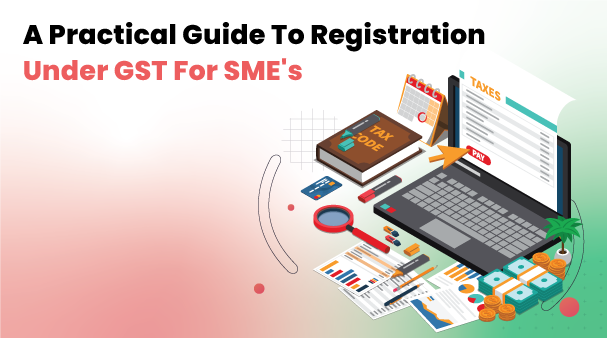India implemented Goods and Service Tax (GST) on 1st July 2017, replacing several indirect taxes like VAT, Excise, service tax, etc. Every startup, small, and medium businesses, need to apply for a GST registration number, also referred to as GST Identification Number (GSTIN). It is a 15-digit PAN-based unique number allocated to the business and comprises the following:
A supplier needs to obtain the GSTIN in each state from which goods and services are supplied.
Why should you register under GST?
GST registration makes small and medium businesses legitimate and authenticated. It opens up various business opportunities with corporates. Small businesses do not need to deal with further compliance once GST registration is completed. GST for small businesses allows applying for loans with low business loan interest rates. In addition, it saves cost and time due to a streamlined accounting workflow.
●Helps businesses establish a presence in the market:Small and medium businesses are the most benefited by voluntarily registering for the GSTIN. It ensures large enterprises regarding no fraudulent activities or transactions while doing business and thus provides business opportunities.
●Eliminate different effects of taxes:Small, medium and large businesses had to pay taxes on taxes before GST implementation. Since GST was introduced, these cascading effects of taxes have been eliminated.
●Get loans easily:GST-registered startups and small and medium businesses can easily get a reliable SME/ MSME business loan immediately.
●GST exemption for small businesses:Small businesses with an annual turnover between 20 lakhs to 70 lakhs can lower taxes through GST exemption for small business schemes.
Is the GST number required for small and medium businesses?
GST registration is compulsory for businesses with more than 20 lakhs annually. The limit is ten lakhs for states Arunachal Pradesh, Himachal Pradesh, Assam, Manipur, Meghalaya, Jammu & Kashmir, Mizoram, Sikkim, Nagaland, Tripura, and Uttarakhand. GST requirements for small businesses for inter-state transactions:
● Inter-state or export supply of services with aggregate turnover above 20 lakhs
● Inter-state or export supply of goods in all cases, even if the value of the goods is Rs. 1.
GST registration is mandatory for:
● Supply goods through an e-commerce portal
● Supply goods in the course of inter-state trade
● For service providers, casual taxable person, TDS/TCS deductor, agent for registered person, input service distributor, e-commerce operator, and online information & database access retrieval service provider.
GST registration is exempted for:
● Individuals supplying agricultural produce
● Individuals making only exempt supplies of goods and services
● Individuals making supplies entirely covered under reverse charge
How do you register a small and medium business under GST?
The Ministry of Finances has simplified the GST registration procedure online. The applicant can register through the GST Portal. The portal generates GST ARN after the application is submitted. The applicant can check the status of the application and post queries using this number. The taxpayer receives a GST registration certificate and GSTIN within seven days of ARN generation.
GST register process
● Access the GST Portal ->https://www.gst.gov.in/ > Services -> Registration > New Registration option.
● Temporary Reference Number (TRN) generation with OTP validation:
○ Select Taxpayer type
○ Choose the state for business permission
○ Enter the legal name of the business
○ Provide the PAN number of the business
○ Provide your email address and click proceed button
○ OTP verification: Enter the OTP in the mobile and email OTP fields
○ After the successful completion of these steps, TRN is generated.
○ Login with TRN to continue the registration process.
● Provide business information:
○ Enter the trade name of the business
○ Provide the constitution of the business
○ Provide district, sector/ unit from the drop-down list
○ Enter division code, and range code, and select the appropriate choice
○ If necessary, opt for the composition scheme
○ Enter the business commencement data
○ Select liability date for registration
● Provide promoter information:
○ Stakeholder’s personal details
○ Designation
○ DIN of the promoter (any of the Private Limited Company,Public Sector Undertaking, Public Limited Company, Foreign Company registered in India, Unlimited Company)
○ Enter citizenship, PAN, AADHAR, residential address and authorized signatory information
● Provide Principal Place of business like address, official contact details, and nature of possession of premises
● Provide details of goods and services
● Enter bank account details
● Verify the application
● ARN is generated.
Steps for registration under the Goods and Services Tax Act 2017:
● Go to the GST Portal and follow the procedure as mentioned above to apply and register for the GSTIN.
● Submit scanned copies of all the documents online. Submit physical copies of documents if you receive an email asking for printed documents.
● Provide names and HSN/SAC code of goods and services. Applicants can mention a maximum of five goods or services.
● Sign the registration form through a digital signature or e-verify the registration form through an AADHAR card.
The GST registration process for individuals is the same as mentioned above. If you want to fill the GST form, click here.
Forms required to be filled out for registering Tax numbers under GST Act 2017:
GST registration for new business requires the following forms to be filled:
● GST REG-01: Application
● GST REG-02: Acknowledgement for Registration
● GST REG-03: Additional Information/Clarification/Documents if required
● GST REG-06: Registration Certificate
● GST REG-07: Application for Registration as Tax Deductor at source (u/s 51) or Tax Collector at source (u/s 52)
● GST REG-10: Registration of person supplying online information and database access or retrieval services
● GST REG-12: Order of Grant of Temporary Registration
● GST CMP-01: Intimation to pay tax under section 10
Business requirements for GST registration in India:
● Business with an annual turnover exceeding forty lakh rupees (ten lakh rupees for North Eastern states)
● Business involving inter-state supplies of goods
● E-commerce operators and entities
● Importer/ exporter individual
Advantages of GST for small and medium (SMB) businesses:
● Legal and authorized recognition of the business making it competitive in the marketplace
● Proper accounting of paid taxes provides opportunities to work with MNCs
● Legally authorized to collect tax from purchases
● Various other benefits coming under GST laws
● Online product sales through E-commerce websites
● PAN-India business without any restrictions
● Current bank account opening
● Eligibility for government tenders
How can Wepsol GST Software help startups and SMEs while doing GST registration?
Wepsol helps you with the entire GST filing process through GST billing software for small businesses. You need to provide GST-compliant data to Wepsol professionals. They will assist you with various services, including monthly GST returns, annual return-GSTR-9, claiming optimal ITC, reports & downloads, comparison, analysis, and decision making with timely actions.

